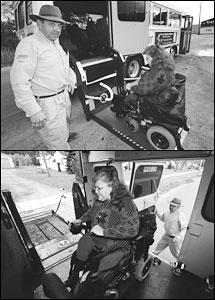MLUI / Articles from 1995 to 2012 / Top Transit Leaves No One Behind
Top Transit Leaves No One Behind
Bridging the gap for riders with disabilities in Michigan
March 5, 2003 | By Kelly Thayer
Great Lakes Bulletin News Service
 | |
| MLUI/Pat Owen | |
| Transit services for people with disabilities — including wheelchair access and on-call pickup — are essential in Traverse City (above) and across the state for connecting citizens with jobs, health care, family, and friends. Michigan needs better funding and service coordination to provide truly excellent paratransit service. |
Unreliable bus service and hard-to-reach stops are some of the persistent problems with Michigan public transit that put thousands of people in danger of losing jobs and contact with friends and family. For seniors and people with disabilities, moreover, these transit challenges are many times more difficult and disturbing. And these populations are growing rapidly in Michigan.
The baby boom generation is inching towards retirement, and more people with disabilities are joining the work force and living independently. Michigan’s future plans for more efficient and effective transit systems must include strategies for better accommodating those who need accessible public transit to fully engage in everyday life.
Availability and Accessibility
A well-functioning “paratransit” system — one that serves riders with disabilities — is literally the vehicle that many Michigan residents must have in order to live independently. Paratransit service varies from community to community and state to state. But in general, paratransit service is comparable to conventional bus service, includes lift-equipped buses for riders who use wheelchairs, and provides voice and visual cues for riders. It’s also simply a matter of making public transit available to all residents in all parts of the state.
This is particularly important in Michigan, where 34 of 83 counties have very little transit coverage. Universal transit services and paratransit accommodations are essential for seniors and people with disabilities to travel freely, join the work force, and take advantage of libraries, museums, parks, shopping districts, and entertainment venues. Optimal paratransit service is accessible, safe, convenient, and affordable for all.
But in Michigan and most other states, transit and paratransit services do not exist in many areas or are extremely limited and unreliable in scheduling and routing. In a 2000-2001 survey of people with disabilities in Michigan, for example, 61 percent rated their transportation service as “bad.” Many transit and paratransit services arrive as much as two hours later than scheduled, and sometimes not at all. As a result, people with disabilities miss medical appointments and other important engagements. They also fail to find jobs or to keep them because they arrive late or miss work entirely.
National Leaders
Florida and New Jersey, however, are two states that have made a commitment to fully incorporating paratransit in their public transit planning. The result is greater system efficiency overall and exemplary service.

Florida, for example, recently won the Community Transportation Association of America’s state achievement award for its insightful and innovative paratransit planning. Florida’s greatest achievement was its success in overcoming one of the biggest barriers to successful paratransit: Service coordination.
Florida maximizes the use of its paratransit vans and buses by mandating that a central, local coordinating body brokers all paratransit services in an area. Most states provide transportation and paratransit services through a number of independent departments and agencies, which results in fragmented funding and uncoordinated efforts. The separate agencies do not work from the same plan or toward the same goal. A common result is that paratransit vans belonging to one service provider, such as a senior center, often sit idle while clients of another agency wait for their van to arrive.
Florida’s process requires all service providers, as well as public transportation agencies, to coordinate services. Local coordinating agencies maximize services by dispatching paratransit vans and buses according to an overall plan and specific needs.
New Jersey also excels in paratransit services and has achieved a remarkable level of transit coordination, including transit availability in all counties. New Jersey has been successful in part because it uses casino revenues to provide transit agencies with additional money for paratransit services. It also mandates that transit agencies coordinate paratransit services. The casino revenues overcome fiscal risks that local agencies might fear when adding paratransit accommodations. The coordination mandate keeps agencies thinking of opportunities to provide seamless service.
Paratransit in Michigan
Michigan has made efforts toward coordinating and extending overall transit coverage but remains fragmented in its paratransit system. The primary problem is a lack of incentive for paratransit improvements and no mechanism for making them. Therefore, most transportation services in the state are not coordinated in a larger planning effort that builds in paratransit, and many local areas have not chosen to provide transit services.
Lawmakers are taking steps to solve these problems, but there is much more to do. The Michigan Legislature recognizes the importance of extending transit service throughout the state and included a provision in the 2001-2002 budget that requires paratransit service be made available throughout Michigan. However, the Legislature has yet to fund this mandate, making implementation impossible.
In addition to boosting funds and increasing overall transit coverage, Michigan also must start planning for paratransit by assessing inefficiencies in the current system that waste taxpayer money. Such information is vital for agencies to identify opportunities for improvement and move toward greater coordination of services. Mandating coordination and making services widely available, especially in rural areas, are the key components for establishing an effective paratransit system.





